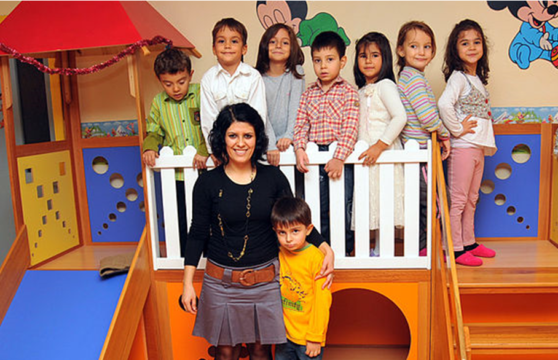High-quality Early Childcare = Later Academic Success?
Two documents suggest that investing in the early years of poor children is crucial to long-term success.
This post is also available in: Spanish
The path towards establishing government-wide early childhood public policies varies throughout Latin America and the Caribbean. As a result, it has been proposed to the countries of the region to establish an Early Childhood Education Quality Agenda that considers a broad and relevant overview of early childhood, embraces the relationship between learning and development, and emphasizes both structural and procedural factors.
The sixth recommendation of the Declaration of the Regional Forum: Towards Quality Early Childhood Education, highlights the importance of developing a competence framework for those working on the field, promoting a system of training—both initial and continuous—and certification of competencies that strengthens early childhood care in the region.
The following study, prepared by Javier Quesada and Claudia Castro with the support of the Inter-American Dialogue, the Inter-American Institute for Children and Adolescents (IIN-OAS), and the LEGO Foundation, proposes a framework of basic and universal competencies that should be included in training/certification programs, so that they are present in the region’s future curricula. This framework is a common starting point that each of the countries can expand upon based on their context and needs.
Beyond each country or culture’s specificities, six priority competencies should be included:
These general competencies, which involve specific skills for people in early childhood care and education, should be acquired through training systems that consider the diversity of previous careers and experiences. Each country will be able to suggest methodologies and strategies according to the needs and learning styles of care workers, and address the governmental challenge of holding trainings and adjusting to their own qualification systems.
On July 8, the Inter-American Dialogue and the Inter-American Institute for Children and Adolescents (IIN-OAS), with the support of the LEGO Foundation, held an online event to present the report: Competence Frameworks for Early Education and Childcare Staff.
Ariel Fiszbein, director of the Education Program at the Inter-American Dialogue, shared opening remarks. Presenters included: Víctor Giorgi, general director of the IIN-OAS; Ana Maria Nieto, early childhood senior program specialist at the LEGO Foundation; Javier Quesada, former undersecretary of early childhood at the National Secretariat for Children, Adolescents and the Family of the Ministry of Social Development of Argentina; Claudia Castro, specialist in education and health and advisor for the Argentine Society of Pediatrics; Yannig Dussart, early childhood development manager at UNICEF’s Regional Office for Latin America and the Caribbean; Irma Luna, director of early childhood education at the Ministry of Public Education of Mexico; and Ely Harasawa, former director of the Happy Parenting Program of the Brazilian Ministry of Citizenship.
Javier Quesada and Claudia Castro presented the report, which incorporates comments and suggestions from a validation workshop held in May where experts from Argentina, Chile, Colombia, Ecuador, Mexico, Paraguay, Peru, and Uruguay participated. The report developed the competence profile according to the roles and functions of early education and care staff, who are mainly mothers and women in the community. Ideally, countries could revise their training programs based on this framework. As a result, these competencies could help define the standards for certification in the region. Quesada and Castro explained that the idea is not to impose a standardization of the framework, but that each country executes the necessary adjustments, expansions, and modifications based on their institutional capacities, particular needs, and age range, among others. They stressed that the document should lead to a local implementation strategy through a flexible methodological model.
Yannig Dussart began his remarks by stressing that he fully agrees with the idea of not imposing a standardization of the framework since adaptability is key to incorporating diversity and facilitating the exchange of experiences. He considers this to be very important in the context of the region, given the great diversity and heterogeneity—although these same factors present challenges in terms of training and certification. He shared that the creation and establishment of a framework does not guarantee quality services by itself; this starting point must be complemented by concrete actions. Later in the presentation, he mentioned that it would be useful to complement this work with specific cases to help countries implement such actions. Agreeing with the study, he deemed the role of families fundamental, since they should be the focal point of the educational process. He also highlighted the importance focusing on the needs of the child, ensuring quality and equality in interactions, fostering dialogue as well as children with disabilities. He concluded by claiming that it is necessary to strengthen the human talent of the region, supporting the countries so that they can strengthen their training processes.
Irma Luna continued, emphasizing that in order to offer early childhood quality education, training caregivers is necessary. She agreed with Dussart on the role of the family in early childhood education, noting that schools and homes are not, and should not be, separate, since children’s growth occurs in both. She explained that an educational agent can understand and build bridges with the family. Regarding what remains to be done, Luna stated that the region’s training and certification plans should be reviewed, strengthening capacities for observation work and theoretical-conceptual tools for systematization, as well as strengthening the inclusive and humanist approach. She stressed that there is a need for economic and social recognition of educational agents, since children require professionals committed to their development. Referring to the document, Luna said that these competencies clearly reflect Mexico’s needs and what must be put in place. Finally, she reflected on how formal education requires a different perspective than informal education, yet both require quality education.
Lastly, the panel discussion featured Ely Harasawa. Harasawa stressed that the active participation of civil society is essential for public policies to be continuous, sustainable, and strengthened. She emphasized that having a competence framework is an important step forward and a starting point for improving the quality of early childhood education. However, the framework also sheds light on new challenges, as each of the competencies requires specific efforts. Among these upcoming challenges, she mentioned structural and procedural factors (institutional conditions and selection processes), and working conditions (the type of hiring generates a lot of turnovers, adequate pay, workload, etc.), among others. She then raised a question about the minimum prerequisites for hiring, noting that it is a consideration that should be taken, especially in the case of unqualified professionals. Harasawa concluded by stating that policy intersection and an intersectoral approach are key, as they allow for a more integrated vision for development and an improvement in the quality of services.
Competence Frameworks for Early Education and Childcare Staff
Declaration of the Regional Forum: Towards Quality Early Childhood Education
Two documents suggest that investing in the early years of poor children is crucial to long-term success.
An op-ed piece on the importance of developing “soft skills” in school.
Promoting economic growth by investing in human capital through education.

